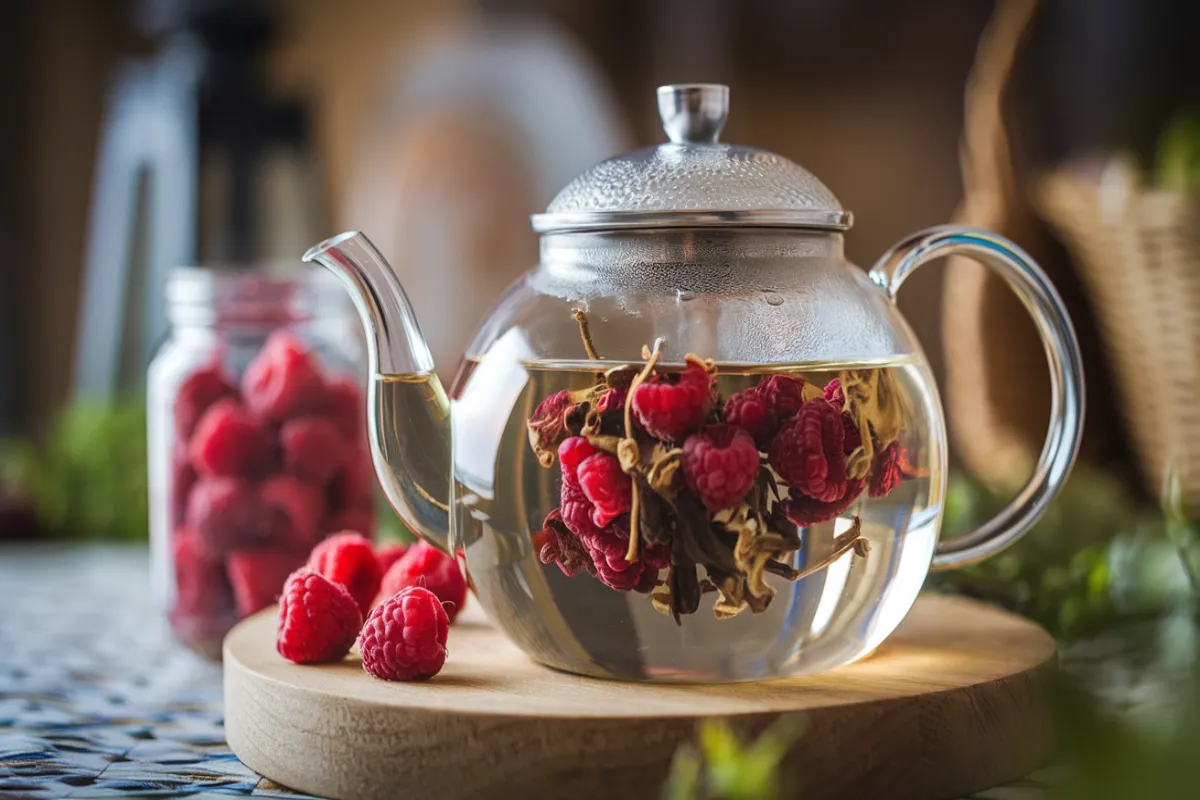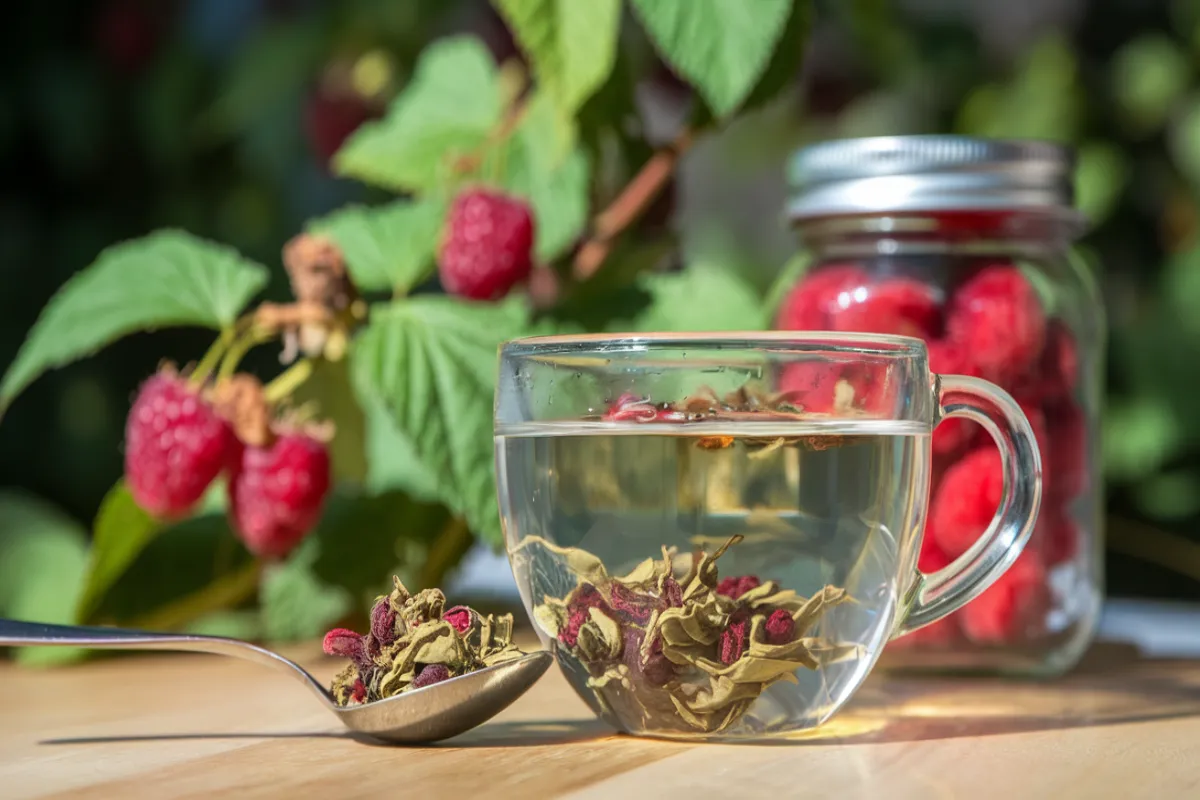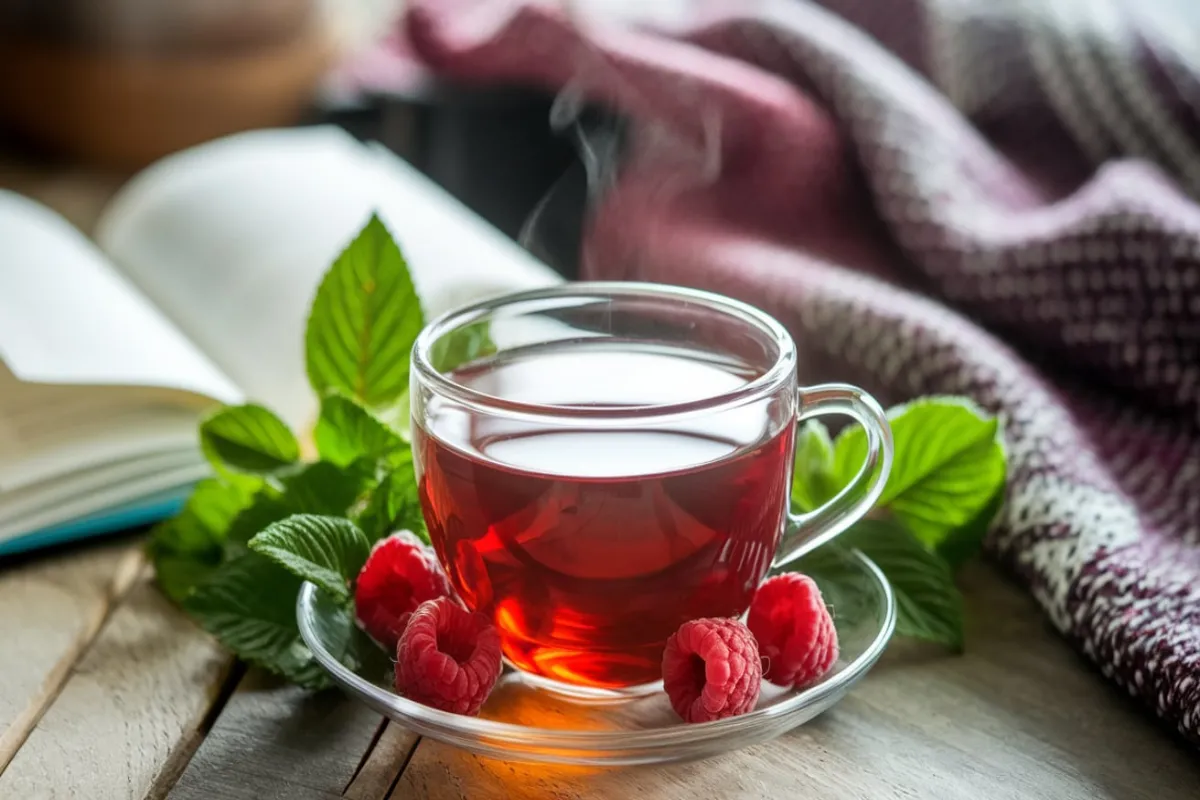Introduction
Raspberry tea is a soothing herbal beverage that has been cherished for centuries, not only for its delicate flavor but also for its impressive health benefits. Made from the leaves of the red raspberry plant (Rubus idaeus), raspberry tea is packed with nutrients and antioxidants that make it much more than a refreshing drink. Although it’s commonly known for its ability to support women’s reproductive health, raspberry tea offers numerous benefits for everyone.
In this article, we’ll take a detailed look at what raspberry tea is good for. From its health benefits and traditional uses to its nutrient content and how to brew the perfect cup, raspberry tea has something to offer for your overall wellness.
What Is Raspberry Tea?
Raspberry tea is brewed from the dried leaves of the red raspberry plant. While many people associate raspberry drinks with the sweet and tangy flavor of the fruit, raspberry leaf tea has a more subtle, earthy taste with just a hint of fruitiness. Despite its mild flavor, the tea is rich in essential vitamins and minerals, such as vitamin C, magnesium, calcium, and potassium.
Raspberry tea is also loaded with antioxidants, which help fight free radicals in the body and reduce the risk of chronic diseases. It’s no wonder that this tea has been used for centuries in herbal medicine, especially for its benefits to women’s health, digestion, and overall well-being.

Health Benefits of Raspberry Tea
Raspberry tea offers a wide range of health benefits. Below, we’ll explore some of the most notable ways this herbal infusion can improve your health.
1. Rich in Nutrients and Antioxidants
Raspberry leaves contain several key nutrients that contribute to good health. These include:
- Vitamin C: An essential nutrient that boosts the immune system, supports skin health, and aids in the absorption of iron.
- Magnesium: Important for muscle function, nerve transmission, and heart health.
- Calcium: Vital for strong bones and teeth, as well as maintaining healthy blood pressure levels.
- Potassium: Helps regulate fluid balance in the body and supports heart health.
Raspberry tea is also a potent source of antioxidants, which help neutralize harmful free radicals. These antioxidants, including tannins and flavonoids, play a crucial role in protecting the body from oxidative stress and reducing inflammation. By regularly consuming raspberry tea, you can lower your risk of developing chronic conditions like heart disease and cancer.
2. Supports Reproductive Health
One of the most well-known uses of raspberry tea is its ability to support women’s reproductive health. Raspberry leaf tea acts as a uterine tonic, helping to tone and strengthen the muscles of the uterus. For this reason, it has been a popular remedy among women during pregnancy, especially in the third trimester. Many midwives recommend raspberry tea to help prepare the uterus for labor, as it may lead to more efficient contractions and potentially reduce labor time.
However, the benefits of raspberry tea extend beyond pregnancy. Women who experience menstrual cramps or irregular periods often turn to raspberry tea for relief. The tea’s anti-inflammatory properties and its ability to regulate hormones can help ease discomfort during menstruation, making it a natural remedy for menstrual pain.
3. Improves Digestion and Eases Inflammation
Raspberry tea is also known for its positive effects on the digestive system. The tannins found in raspberry leaves have natural astringent properties, which help soothe digestive issues like diarrhea and bloating. By reducing inflammation in the digestive tract, raspberry tea can alleviate discomfort caused by irritable bowel syndrome (IBS), gastritis, and other digestive disorders.
In addition, raspberry tea’s anti-inflammatory properties make it a good choice for individuals dealing with conditions like arthritis or general inflammation. By calming the body’s inflammatory response, this tea can help reduce pain and improve overall mobility.
4. Boosts Immune System Function
Thanks to its high concentration of vitamin C, raspberry tea is an excellent choice for boosting immune system function. Vitamin C plays a key role in stimulating the production of white blood cells, which help the body fight off infections and illnesses. Drinking raspberry tea regularly may enhance your body’s ability to ward off colds, flu, and other common ailments.
The tea’s high levels of antioxidants further support immune health by protecting your cells from oxidative stress, which can weaken the immune system over time. By regularly sipping on raspberry tea, you’ll not only enjoy a delicious drink but also help your body stay healthy and strong.
5. Promotes Heart Health
Drinking raspberry tea can also benefit your heart. The flavonoids and tannins found in the leaves have been shown to help lower blood pressure and improve circulation. This makes raspberry tea a great choice for anyone looking to protect their heart health naturally.
Additionally, regular consumption of raspberry tea may help improve cholesterol levels. The tea’s antioxidant properties help reduce LDL cholesterol (the “bad” cholesterol) while raising HDL cholesterol (the “good” cholesterol). By balancing cholesterol levels and improving overall cardiovascular function, raspberry tea helps lower the risk of developing heart disease.
6. Helps with Detoxification
Raspberry tea is a natural diuretic, which means it promotes the body’s ability to eliminate excess water and toxins. By encouraging frequent urination, raspberry tea helps flush out harmful substances from the body. This can be especially beneficial for those who struggle with water retention or bloating.
In addition to supporting kidney function, raspberry tea also aids in maintaining a healthy liver. By helping the body detoxify, this tea ensures that your internal systems run smoothly and efficiently.
7. Supports Healthy Skin
The vitamins and antioxidants in raspberry tea can work wonders for your skin. The vitamin E and ellagic acid present in the tea help protect the skin from damage caused by free radicals, UV rays, and environmental toxins. By drinking raspberry tea regularly, you may notice a reduction in the appearance of wrinkles and fine lines, leading to a more youthful and radiant complexion.
Ellagic acid, in particular, has been shown to have anti-aging properties. This antioxidant helps protect collagen, the protein responsible for skin’s elasticity and firmness. So, by enjoying raspberry tea, you’re not just sipping a delicious drink—you’re also helping to preserve your skin’s natural beauty.

Traditional Uses of Raspberry Tea
Raspberry tea has been used in herbal medicine for centuries, particularly for its reproductive and digestive benefits. Here are some of the traditional ways raspberry tea has been used:
1. Pregnancy and Childbirth
Raspberry tea has long been used by pregnant women to support uterine health. Traditionally, women would drink raspberry tea in the third trimester to prepare the uterus for childbirth. The belief was that raspberry tea could help make contractions more efficient, leading to shorter labor times and fewer complications.
Even today, many midwives recommend raspberry tea to expectant mothers. However, it’s always best to consult with a healthcare provider before consuming raspberry tea during pregnancy, especially during the first trimester when the uterus is particularly sensitive.
2. Menstrual Health
Throughout history, raspberry tea has been used as a natural remedy for menstrual cramps and heavy periods. Women suffering from irregular cycles or excessive bleeding often turned to raspberry tea for its ability to regulate the menstrual cycle and ease discomfort. The tea’s astringent properties help reduce excessive bleeding, while its anti-inflammatory effects soothe the pain associated with menstruation.
3. Wound Healing and Skin Care
In addition to its use as a beverage, raspberry leaves were traditionally used to treat minor cuts, burns, and skin irritations. The tannins in raspberry leaves have natural astringent properties that help promote healing and reduce swelling. Today, drinking raspberry tea can still support healthy skin by providing the body with antioxidants that help repair damaged skin cells.
How to Make Raspberry Tea
Making raspberry tea at home is easy, and you only need a few simple ingredients. Follow these steps to brew a perfect cup of raspberry tea:
Ingredients:
- 1 tablespoon of dried raspberry leaves
- 1 cup of boiling water
- Honey or lemon for taste (optional)
Instructions:
- Place the dried raspberry leaves in a cup or teapot.
- Pour the boiling water over the leaves and cover the pot or cup.
- Allow the tea to steep for 5-10 minutes, depending on how strong you like your tea.
- Strain the tea and add honey or lemon if desired.
You can also enjoy raspberry tea iced by brewing it, letting it cool, and pouring it over ice. For a refreshing twist, add fresh raspberries and a few mint leaves to your glass.
How to Enjoy Raspberry Tea
Raspberry tea is a versatile drink that can be enjoyed in a variety of ways. Here are a few suggestions:
- Hot: A warm cup of raspberry tea is perfect for relaxing after a long day or when you need a moment of calm.
- Iced: On a hot summer day, iced raspberry tea is a delicious and refreshing alternative to sugary soft drinks.
- Blended with other teas: Raspberry tea pairs well with other herbal teas like peppermint, chamomile, or green tea for a unique flavor combination.

Potential Side Effects and Precautions
Although raspberry tea is generally considered safe for most people, it’s important to drink it in moderation. Pregnant women should consult their healthcare provider before consuming raspberry tea, especially during the early stages of pregnancy. While raspberry tea is often recommended in the third trimester, it may not be suitable for all expectant mothers.
Additionally, individuals with sensitive stomachs may experience mild irritation from the tannins in raspberry tea. As with any herbal remedy, it’s a good idea to talk to your doctor if you’re taking medications or have existing health conditions.
Conclusion
Raspberry tea is much more than a soothing herbal beverage—it’s a powerhouse of nutrients and antioxidants that offer a wide range of health benefits. From supporting women’s reproductive health and improving digestion to boosting immunity and promoting healthy skin, this tea can help enhance your overall wellness. By making raspberry tea a part of your daily routine, you’ll enjoy a delicious, natural way to support your health and well-being.
Whether you’re looking to ease menstrual cramps, detoxify your body, or simply enjoy a refreshing drink, raspberry tea has something for everyone. Brew a cup today and discover the benefits for yourself.

